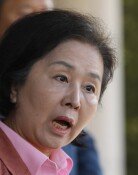US diplomat asks S. Korea to reduce oil imports from Iran
US diplomat asks S. Korea to reduce oil imports from Iran
Posted January. 18, 2012 07:55,
High-ranking U.S. diplomat Robert Einhorn said in Seoul on Tuesday that the situation in Iran and North Korea are related, urging South Korea to participate in international sanctions on Iran. Einhorn, who is the State Department`s special adviser for nonproliferation and arms control, urged Seoul to reduce imports of Iranian oil in Washington`s first direct demand to that effect.
○ `U.S. partners should cut imports of Iranian oil`
Einhorn officially requested that South Korea participate in sanctions on Iran early in his meeting with South Korean Deputy Foreign Minister Kim Jae-shin Tuesday morning.
"I think progress in one will help us achieve progress in the other (North Korean nuclear program)," the U.S. official said, adding, That`s why it`s so important that our two governments work closely together on this Iran problem. South Korea is a global player when it comes to this issue."
Daniel Glaser, the Treasury`s assistant secretary for terrorist financing and financial crimes, also attended the meeting, showing the magnitude of U.S. pressure on South Korea. He formerly inflicted "blood drying pain" on the North by imposing sanctions on the Macau-based Banco Delta Asia, which had financial transactions with North Korea, as deputy assistant Treasury secretary in 2006 and 2007.
Einhorn said, "We are urging all of our partners to reduce purchase of Iranian oil and transactions with the Iranian central bank."
In a closed session that followed the meeting, he reportedly said other countries including those in the European Union and Japan are joining the campaign to sanction Iran, and that even China, which has ostensibly declined to join, has cut Iranian oil imports by the largest amount.
Deputy Minister Kim said the South Korean government understands the need to resolve the Iranian nuclear problem and will cooperate as much as possible to resolve the matter, but reportedly added, If drastic measures are taken, they could break stability in the international oil market and negatively affect the South Korean economy.
○ Cut in Iranian oil imports is key
The U.S. delegation led by Einhorn also spoke to officials from the Strategy and Finance Ministry and the Knowledge Economy Ministry in Seoul. Those who attended the talks said Washington stressed efforts to impose sanctions in phases through cautious coordination to ensure that U.S. allies will not suffer damage.
A government source in Seoul said, The U.S. never mentioned any numbers on the scale of reduction in the import of Iranian oil, adding, It was somehow noted that countries face different situations in oil supply, and a single barometer cannot be applied unilaterally. So (the size of reduction) will inevitably have to be determined by comprehensively considering the situation of different countries.
South Korea is a country urging the international community for support to resolve the North Korean nuclear issue and will host the Nuclear Security Summit. We should make efforts to the extent that we can.
The U.S. will prepare a report on international crude oil supply 60 days after effectuation of its National Defense Authorization Act. Based on the report, it will determine whether to impose sanctions 90 days thereafter. The sanctions will be imposed 180 days after the process ends.
Until then, Seoul plans to adjust the scale and timing for the reduction in Iranian oil imports while continuing to discuss with Washington an exemption from the defense law.
lightee@donga.com







